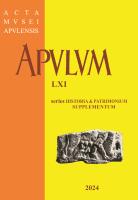IOAN DE VINTZ – UN POÈTE INCONNU
Ioan de Vintz – an Unknown poet
Author(s): Dana ShishmanianSubject(s): History, Language and Literature Studies, Literary Texts, Cultural history, Modern Age, Romanian Literature, 17th Century
Published by: Muzeul National al Unirii Alba Iulia
Keywords: baroque; vision; soul; body; Ioan de Vintz;
Summary/Abstract: Wise Varnava’s wonderful apparition of his vision with example for all, this Romanian translation-recreation in verse, carried out in Transylvania in 1670, of the Dialogus of the Hungarian baroque poet Nyéki Vörös Mátyas, can be considered at this time the first work of the pope Ioan of Vintz. The indefatigable Transylvanian priest and scholar, translator, and publisher of worship books in Romanian, thus reveals himself as the initiator of the dramatic poem in Romanian literature, and as a remarkable religious poet, whose pathos about the personal salvation, on the razor blade of faith and doubt, anticipates the psalmist vein, two and a half centuries later, of the great Romanian poet Tudor Arghezi. On the European level, this Vision of Varnava represents the last link – of great originality, through the invention of the character-witness of the "wise Varnava", an absolute literary hapax – of the centuries-old literary pattern of the vision on the dispute between the soul and the body (known as Visio Philiberti). The Romanian poem of 1670 thus appears as the last station of a literary tradition that stretches an enormous arc, in space and time, between the Orthodox East founded in the first four centuries of the Christian era, teeming with apocalyptic apocrypha, and the Catholic West, founder of the universities where scholasticism takes up and develops the Byzantine renaissance, but becoming, with the emergence of Protestantism, a multi-cultural world. A literary tradition which, adapting to and surpassing all the faiths it crosses, reveals to us, through its baroque inflections in the seventeenth century, the efflorescence of the individual conscience facing the eternal problem of death. The study also includes some new hypotheses about the beginnings, totally unknown today, of Ioan of Vintz as a literate and scholar, as he was ennobled by the Prince Michael Apafi I in 1664 for cultural merits: we assume he might have taken part in the work of Romanian translation and publishing of the New Testament (1648) and Psalter (1651). We are questioning as well the last period of his career, also ignored at this time (1689 to 1696, assumed year of death), when he was probably supporting the project of the union of Romanian Orthodox church with the Roman Catholic church, and built, in his own ecumenic, supra-confessional spirit, some other publishing projects, such as the viaticus of Puritan origin Cărare pre scurt (Short Path), printed, as we demonstrate, in 1695 (not in 1685), and even the Vision of Varnava, which he was unable to see in print being interrupted by death.
Journal: Apulum
- Issue Year: 61/2024
- Issue No: 1 supp.
- Page Range: 49-66
- Page Count: 18
- Language: French
- Content File-PDF

